Poll: Nearly one out of every four plans to build a house in post-war world
By George Gallup, Director, American Institute of Public Opinion
…
By George Gallup, Director, American Institute of Public Opinion
…
U.S. State Department (September 1, 1945)
740.00116 PW/9-145: Telegram
London, September 1, 1945 — 4 p.m.
[Received 6:33 p.m.]
8941
From Hodgson. Refer Embassy cable 8298 of August 16 and Department’s cable 7493 of August 31. At meeting of War Crimes Commission held on August 29 Commission unanimously adopted recommendations contained in document SFEC 1 as revised by Special Committee subject to proviso that they may require reconsideration by Commission if terms of surrender should be found to be inconsistent with them. Copies of document adopted by Commission (C. 145 (1)) being forwarded today. Australia urged action. I opposed immediate action by Special Committee and requested postponement of its meetings but did not feel justified in absence of Department’s view in further opposing action by it and Commission. Copies of draft sent to Judge Advocate General of Army on August 16. [Hodgson.]
WINANT
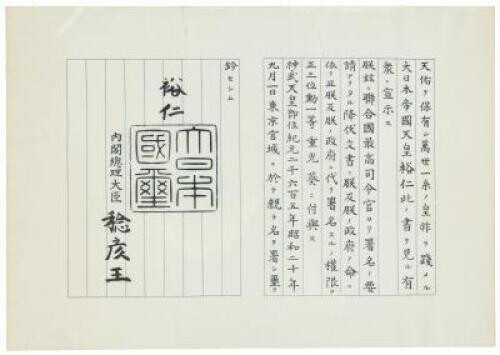
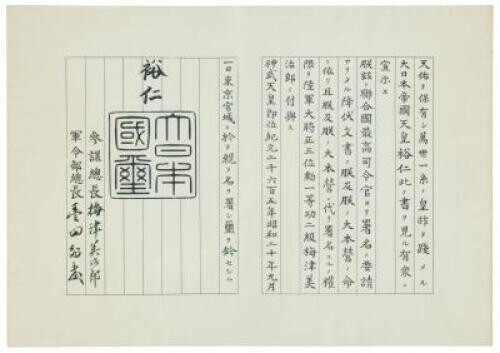
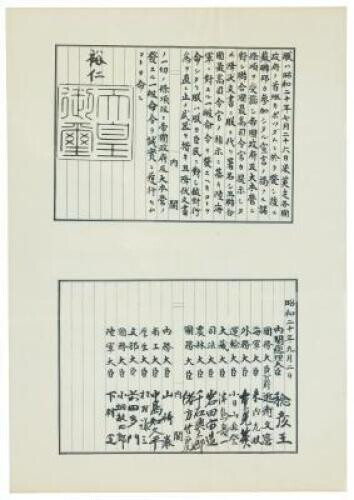
Delivered aboard USS Missouri, Tokyo Bay
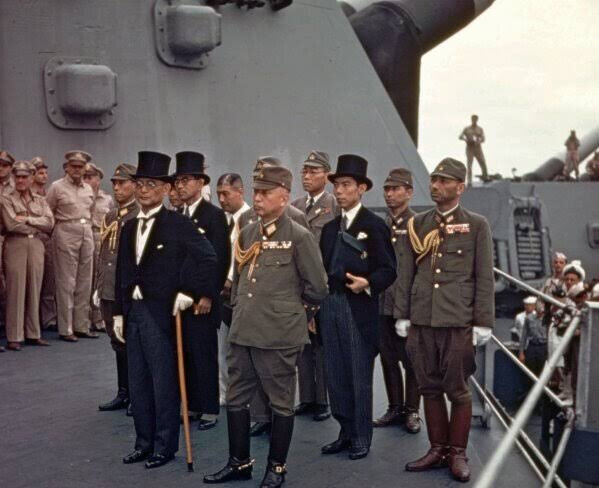
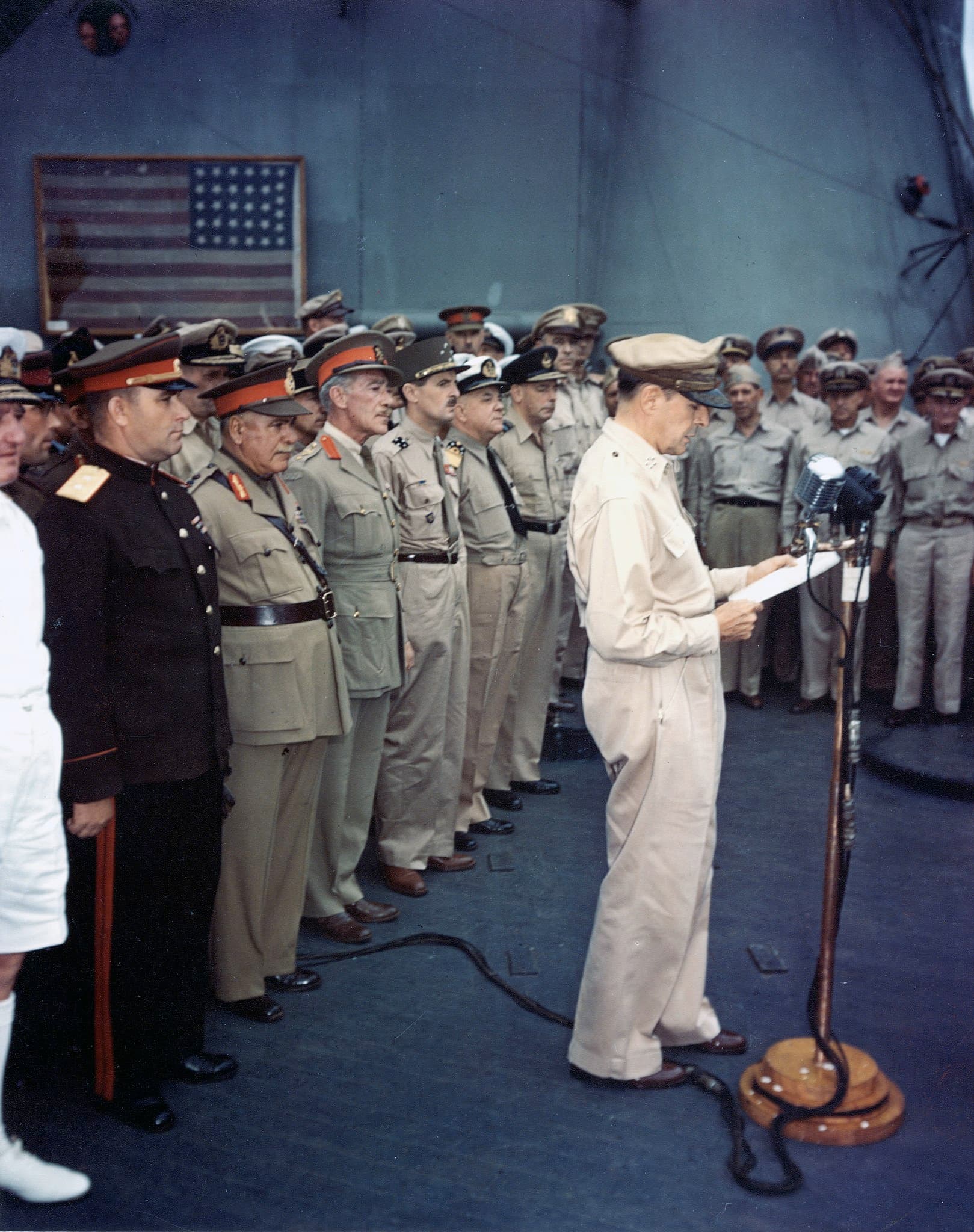
We are gathered here, representatives of the major warring powers, to conclude a solemn agreement whereby peace may be restored.
The issues involving divergent ideals and ideologies have been determined on the battlefields of the world, and hence are not for our discussion or debate.
Nor is it for us here to meet, representing as we do a majority of the peoples of the earth, in a spirit of distrust, malice, or hatred.
But rather it is for us, both victors and vanquished, to rise to that higher dignity which alone befits the sacred purposes we are about to serve, committing all of our peoples unreservedly to faithful compliance with the undertakings they are here formally to assume.
It is my earnest hope, and indeed the hope of all mankind, that from this solemn occasion a better world shall emerge out of the blood and carnage of the past – a world founded upon faith and understanding, a world dedicated to the dignity of man and the fulfillment of his most cherished wish for freedom, tolerance, and justice.
The terms and conditions upon which surrender of the Japanese Imperial Forces is here to be given and accepted are contained in the Instrument of Surrender now before you.
As Supreme Commander for the Allied Powers, I announce it my firm purpose, in the tradition of the countries I represent, to proceed in the discharge of my responsibilities with justice and tolerance, while taking all necessary dispositions to insure that the terms of surrender are fully, promptly, and faithfully complied with.
I now invite the representatives of the Emperor of Japan and the Japanese government and the Japanese Imperial General Headquarters to sign the Instrument of Surrender at the places indicated.
The Supreme Command for the Allied Powers will now sign on behalf of all the nations at war with Japan.
The representative of the United States of America will now sign.
The representative of the Republic of China will now sign.
The representative of the United Kingdom will now sign.
The representative of the Union of Soviet Socialist Republics will now sign.
The representative of Australia will now sign.
The representative of Canada will now sign.
The representative of France will now sign.
The representative of Netherlands will now sign.
The representative of New Zealand will now sign.
Let us pray that peace be now restored to the world, and that God will preserve it always.
These proceedings are closed.
![]() e, acting by command of and in behalf of the Emperor of Japan, the Japanese Government and the Japanese Imperial General Headquarters, hereby accept the provisions set forth in the declaration issued by the heads of the Governments of the United States, China, and Great Britain on 26 July 1945 at Potsdam, and subsequently adhered to by the Union of Soviet Socialist Republics, which four powers are hereafter referred to as the Allied Powers.
e, acting by command of and in behalf of the Emperor of Japan, the Japanese Government and the Japanese Imperial General Headquarters, hereby accept the provisions set forth in the declaration issued by the heads of the Governments of the United States, China, and Great Britain on 26 July 1945 at Potsdam, and subsequently adhered to by the Union of Soviet Socialist Republics, which four powers are hereafter referred to as the Allied Powers.
We hereby proclaim the unconditional surrender to the Allied Powers of the Japanese Imperial General Headquarters and of all Japanese armed forces and all armed forces under the Japanese control wherever situated.
We hereby command all Japanese forces wherever situated and the Japanese people to cease hostilities forthwith, to preserve and save from damage all ships, aircraft, and military and civil property and to comply with all requirements which may be imposed by the Supreme Commander for the Allied Powers or by agencies of the Japanese Government at his direction.
We hereby command the Japanese Imperial Headquarters to issue at once orders to the Commanders of all Japanese forces and all forces under Japanese control wherever situated to surrender unconditionally themselves and all forces under their control.
We hereby command all civil, military and naval officials to obey and enforce all proclamations, and orders and directives deemed by the Supreme Commander for the Allied Powers to be proper to effectuate this surrender and issued by him or under his authority and we direct all such officials to remain at their posts and to continue to perform their non-combatant duties unless specifically relieved by him or under his authority.
We hereby undertake for the Emperor, the Japanese Government and their successors to carry out the provisions of the Potsdam Declaration in good faith, and to issue whatever orders and take whatever actions may be required by the Supreme Commander for the Allied Powers or by any other designated representative of the Allied Powers for the purpose of giving effect to that Declaration.
We hereby command the Japanese Imperial Government and the Japanese Imperial General Headquarters at once to liberate all allied prisoners of war and civilian internees now under Japanese control and to provide for their protection, care, maintenance and immediate transportation to places as directed.
The authority of the Emperor and the Japanese Government to rule the state shall be subject to the Supreme Commander for the Allied Powers who will take such steps as he deems proper to effectuate these terms of surrender.
Signed at TOKYO BAY, JAPAN at 0903 on the SECOND day of SEPTEMBER, 1945.

By Command and in behalf of the Emperor of Japan and the Japanese Government.

By Command and in behalf of the Japanese Imperial General Headquarters.
Accepted at TOKYO BAY, JAPAN at 0908 on the SECOND day of SEPTEMBER, 1945, for the United States, Republic of China, United Kingdom and the Union of Soviet Socialist Republics, and in the interests of the other United Nations at war with Japan.

Supreme Commander for the Allied Powers.

United States Representative
![]()
Republic of China Representative
![]()
United Kingdom Representative

Union of Soviet Socialist Republics Representative

Commonwealth of Australia Representative

Dominion of Canada Representative
![]()
Provisional Government of the French Republic Representative

Kingdom of the Netherlands Representative
![]()
Dominion of New Zealand Representative
Delivered aboard USS Missouri, Tokyo Bay
My fellow countrymen:
Today the guns are silent. A great tragedy has ended. A great victory has been won. The skies no longer rain death – the seas bear only commerce men everywhere walk upright in the sunlight. The entire world is quietly at peace. The holy mission has been completed. And in reporting this to you, the people, I speak for the thousands of silent lips, forever stilled among the jungles and the beaches and in the deep waters of the Pacific which marked the way. I speak for the unnamed brave millions homeward bound to take up the challenge of that future which they did so much to salvage from the brink of disaster.
As I look back on the long, tortuous trail from those grim days of Bataan and Corregidor, when an entire world lived in fear, when democracy was on the defensive everywhere, when modern civilization trembled in the balance, I thank a merciful God that he has given us the faith, the courage and the power from which to mold victory. We have known the bitterness of defeat and the exultation of triumph, and from both we have learned there can be no turning back. We must go forward to preserve in peace what we won in war.
A new era is upon us. Even the lesson of victory itself brings with it profound concern, both for our future security and the survival of civilization. The destructiveness of the war potential, through progressive advances in scientific discovery, has in fact now reached a point which revises the traditional concepts of war.
Men since the beginning of time have sought peace. Various methods through the ages have attempted to devise an international process to prevent or settle disputes between nations. From the very start workable methods were found insofar as individual citizens were concerned, but the mechanics of an instrumentality of larger international scope have never been successful. Military alliances, balances of power, leagues of nations, all in turn failed, leaving the only path to be by way of the crucible of war. We have had our last chance. If we do not now devise some greater and more equitable system, Armageddon will be at our door. The problem basically is theological and involves a spiritual recrudescence and improvement of human character that will synchronize with our almost matchless advances in science, art, literature and all material and cultural developments of the past two thousand years. It must be of the spirit if we are to save the flesh.
We stand in Tokyo today reminiscent of our countryman, Commodore Perry, ninety-two years ago. His purpose was to bring to Japan an era of enlightenment and progress, by lifting the veil of isolation to the friendship, trade, and commerce of the world. But alas the knowledge thereby gained of western science was forged into an instrument of oppression and human enslavement. Freedom of expression, freedom of action, even freedom of thought were denied through appeal to superstition, and through the application of force. We are committed by the Potsdam Declaration of principles to see that the Japanese people are liberated from this condition of slavery. It is my purpose to implement this commitment just as rapidly as the armed forces are demobilized and other essential steps taken to neutralize the war potential.
The energy of the Japanese race, if properly directed, will enable expansion vertically rather than horizontally. If the talents of the race are turned into constructive channels, the county can lift itself from its present deplorable state into a position of dignity.
To the Pacific basin has come the vista of a new emancipated world. Today, freedom is on the offensive, democracy is on the march. Today, in Asia as well as in Europe, unshackled peoples are tasting the full sweetness of liberty, the relief from fear.
In the Philippines, America has evolved a model for this new free world of Asia. In the Philippines, America has demonstrated that peoples of the East and peoples of the West may walk side by side in mutual respect and with mutual benefit. The history of our sovereignty there has now the full confidence of the East.
And so, my fellow countrymen, today I report to you that your sons and daughters have served you well and faithfully with the calm, deliberated determined fighting spirit of the American soldier, based upon a tradition of historical truth as against the fanaticism of an enemy supported only by mythological fiction. Their spiritual strength and power has brought us through to victory. They are homeward bound – take care of them.
On board all naval vessels at sea and in port, and at our many island bases in the Pacific, there is rejoicing and thanksgiving. The long and bitter struggle, which Japan started so treacherously on the seventh of December, 1941, is at an end.
I take great pride in the American forces which have helped to win this victory. America can be proud of them. The officers and men of the United States Army, Navy, Marine Corps, Coast Guard and Merchant Marine who fought in the Pacific have written heroic new chapters in this nation’s military history. I have infinite respect for their courage, resourcefulness and devotion to duty. We also acknowledge the great contribution to this victory made by our valiant Allies. United we fought and united we prevail.
The port of Tokyo, which was first opened by Commodore Perry in 1853 is now crowded with United States men o’ war. The process of bringing Japan into the family of civilized nations, which was interrupted when Japan launched her program of conquest, will soon begin again.
Today all freedom-loving peoples of the world rejoice in the victory and feel pride in the accomplishments of our combined forces. We also pay tribute to those who defended our freedom at the cost of their lives.
On Guam is a military cemetery in a green valley not far from my headquarters. The ordered rows of white crosses stand as reminders of the heavy cost we have paid for victory. On these crosses are the names of American soldiers, sailors and marines – Culpepper, Tomaino, Sweeney, Bromberg, Depew, Melloy, Ponziani – names that are a cross-section of democracy. They fought together as brothers in arms; they died together and now they sleep side by side. To them we have a solemn obligation – the obligation to insure that their sacrifice will help to make this a better and safer world in which to live.
To achieve this it will be necessary for the United Nations to enforce rigidly the peace terms that will be imposed upon Japan. It will also be necessary to maintain our national strength at a level which will discourage future acts of aggression aimed at the destruction of our way of life.
Now we turn to the great tasks of reconstruction and restoration. I am confident that we will be able to apply the same skill, resourcefulness and keen thinking to these problems as were applied to the problems of winning the victory.
Broadcast from the White House, Washington, D.C.
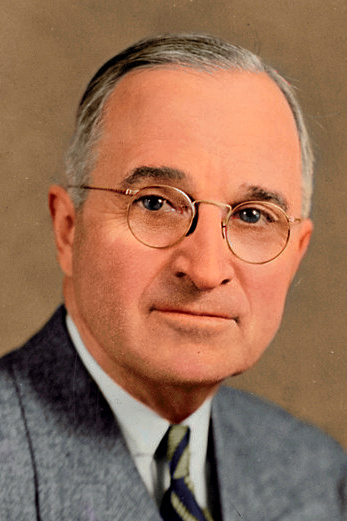
My fellow Americans, and the Supreme Allied Commander, General MacArthur, in Tokyo Bay:
The thoughts and hopes of all America – indeed of all the civilized world – are centered tonight on the battleship Missouri. There on that small piece of American soil anchored in Tokyo Harbor the Japanese have just officially laid down their arms. They have signed terms of unconditional surrender.
Four years ago, the thoughts and fears of the whole civilized world were centered on another piece of American soil – Pearl Harbor. The mighty threat to civilization which began there is now laid at rest. It was a long road to Tokyo – and a bloody one.
We shall not forget Pearl Harbor.
The Japanese militarists will not forget the USS Missouri.
The evil done by the Japanese warlords can never be repaired or forgotten. But their power to destroy and kill has been taken from them. Their armies and what is left of their Navy are now impotent.
To all of us there comes first a sense of gratitude to Almighty God who sustained us and our Allies in the dark days of grave danger, who made us to grow from weakness into the strongest fighting force in history, and who has now seen us overcome the forces of tyranny that sought to destroy His civilization.
God grant that in our pride of the hour, we may not forget the hard tasks that are still before us; that we may approach these with the same courage, zeal, and patience with which we faced the trials and problems of the past four years.
Our first thoughts, of course – thoughts of gratefulness and deep obligation – go out to those of our loved ones who have been killed or maimed in this terrible war. On land and sea and in the air, American men and women have given their lives so that this day of ultimate victory might come and assure the survival of a civilized world. No victory can make good their loss.
We think of those whom death in this war has hurt, taking from them fathers, husbands, sons, brothers, and sisters whom they loved. No victory can bring back the faces they longed to see.
Only the knowledge that the victory, which these sacrifices have made possible, will be wisely used, can give them any comfort. It is our responsibility – ours, the living – to see to it that this victory shall be a monument worthy of the dead who died to win it.
We think of all the millions of men and women in our armed forces and merchant marine all over the world who, after years of sacrifice and hardship and peril, have been spared by Providence from harm.
We think of all the men and women and children who during these years have carried on at home, in lonesomeness and anxiety and fear.
Our thoughts go out to the millions of American workers and businessmen, to our farmers and miners – to all those who have built up this country’s fighting strength, and who have shipped to our Allies the means to resist and overcome the enemy.
Our thoughts go out to our civil servants and to the thousands of Americans who, at personal sacrifice, have come to serve in our government during these trying years; to the members of the Selective Service boards and ration boards; to the civilian defense and Red Cross workers; to the men and women in the USO and in the entertainment world – to all those who have helped in this cooperative struggle to preserve liberty and decency in the world.
We think of our departed gallant leader, Franklin D. Roosevelt, defender of democracy, architect of world peace and cooperation.
And our thoughts go out to our gallant Allies in this war: to those who resisted the invaders; to those who were not strong enough to hold out, but who, nevertheless, kept the fires of resistance alive within the souls of their people; to those who stood up against great odds and held the line, until the United Nations together were able to supply the arms and the men with which to overcome the forces of evil.
This is a victory of more than arms alone. This is a victory of liberty over tyranny.
From our war plants rolled the tanks and planes which blasted their way to the heart of our enemies; from our shipyards sprang the ships which bridged all the oceans of the world for our weapons and supplies; from our farms came the food and fiber for our armies and navies and for our Allies in all the corners of the earth; from our mines and factories came the raw materials and the finished products which gave us the equipment to overcome our enemies.
But back of it all were the will and spirit and determination of a free people – who know what freedom is, and who know that it is worth whatever price they had to pay to preserve it.
It was the spirit of liberty which gave us our armed strength and which made our men invincible in battle. We now know that that spirit of liberty, the freedom of the individual, and the personal dignity of man, are the strongest and toughest and most enduring forces in all the world.
And so on V-J Day we take renewed faith and pride in our own way of life. We have had our day of rejoicing over this victory. We have had our day of prayer and devotion. Now let us set aside V-J Day as one of renewed consecration to the principles which have made us the strongest nation on earth and which, in this war, we have striven so mightily to preserve.
Those principles provide the faith, the hope, and the opportunity which help men to improve themselves and their lot. Liberty does not make all men perfect nor all society secure. But it has provided more solid progress and happiness and decency for more people than any other philosophy of government in history. And this day has shown again that it provides the greatest strength and the greatest power which man has ever reached.
We know that under it we can meet the hard problems of peace which have come upon us. A free people with free Allies, who can develop an atomic bomb, can use the same skill and energy and determination to overcome all the difficulties ahead.
Victory always has its burdens and its responsibilities as well as its rejoicing.
But we face the future and all its dangers with great confidence and great hope. America can build for itself a future of employment and security. Together with the United Nations, it can build a world of peace rounded on justice, fair dealing, and tolerance.
As President of the United States, I proclaim Sunday, September the second, 1945, to be V-J Day – the day of formal surrender by Japan. It is not yet the day for the formal proclamation of the end of the war nor of the cessation of hostilities. But it is a day which we Americans shall always remember as a day of retribution – as we remember that other day, the day of infamy.
From this day we move forward. We move toward a new era of security at home. With the other United Nations we move toward a new and better world of cooperation, of peace and international good will and cooperation.
God’s help has brought us to this day of victory. With His help we will attain that peace and prosperity for ourselves and all the world in the years ahead.

SIX YEARS AGO, the workers of the United States, and of the world, awoke to a Labor Day in a world at war. The democracies of Western Europe had just accepted the challenge of totalitarianism. We in the United States had two years of grace, but the issue was squarely joined at that hour, as we now know. There was to be no peace until tyranny had been outlawed.
Today we stand on the threshold of a new world. We must do our part in making this world what it should be – a world in which the bigotries of race and class and creed shall not be permitted to warp the souls of men.
We enter upon an era of great problems, but to live is to face problems. Our men and women did not falter in the task of saving freedom. They will not falter now in the task of making freedom secure. And high in the ranks of these men and women, as a grateful world will always remember, are the workers of all free nations who produced the vast equipment with which victory was won.
The tasks ahead are great, and the opportunities are equally great. Your government is determined to meet those tasks and fulfill those opportunities.
We recognize the importance and dignity of labor, and we recognize the right of every American citizen to a wage which will permit him and his dependents to maintain a decent standard of living.
The Syonan Shimbun (September 2, 1945)
Agreement signed on U.S. battleship today
On board the 45,000-ton USS Missouri, amid an armada of Allied naval strength riding at anchor in Tokyo Bay, the formal surrender of Japan to the Allies took place this morning at 11 o’clock Tokyo Time.
The proceedings were broadcast from the United States battleship, and relayed by practically all the radio stations of the world, announcing to all nations that as from today the world is again at peace.
With great pomp and splendour, and yet with a solemnity befitting the occasion, Mamoru Shigemitsu, Japanese Foreign Minister, as representative of the Emperor of Japan, and the Chief of Staff of the Japanese Imperial Headquarters, representing the Japanese armed forces, affixed their signatures to the surrender document. On behalf of the Allies, Gen. Douglas MacArthur signed the agreement.
Lieut. General Arthur E. Percival and Lieut. Gen. Jonathan Wainwright, commanders of Singapore and Corregidor respectively at the time of the Japanese offensive in 1942, were called upon by Gen. MacArthur to sign as witnesses.
Then followed the signing of the document by representatives of the Allied nations, in the following order: United States of America, Republic of China, United Kingdom, USSR, Australia, Canada, France, Netherlands and New Zealand.
With this, the proceedings for the formal surrender of Japan were brought to a close.
Harry Truman, President of the United States, then addressed the world from Washington, D.C. In a nine-minute broadcast, Truman said that, thanks to the supreme efforts of the Allies, peace had at last been restored to the world. He hoped that this peace would long continue.
The past years of war against Germany and Japan had been dark years in the history of the world, years which, however, saw the Allies growing from weakness to strength and the world had just listened to the ceremony of the formal surrender of Japan crowning the efforts of the United Nations.
Truman expressed profound gratitude for and deep sympathy with the families of those servicemen and civilians who died in the battlefields of Europe and Asia. He acknowledged that even this final victory could not make up for their loss. To them the world, especially those spared by Providence from the horrors of war, owe an irreparable debt.
…
…
A Reuters wireless broadcast recorded here reported that Admiral Chester Nimitz, Commander-in-Chief of the Allied Pacific Fleets, and Admiral William Halsey, Commander of the United States Third Fleet, went ashore at the Yokosuka Naval Base on an inspection tour of the base.
HANOI (Domei, Aug. 31) – It was reported that negotiations will be conducted today at Mengtze, in the southeastern part of Yunnan Province, between Japanese and Chinese military authorities regarding the entry of Chinese armed forces into Northern Indochina.
TOKYO (Domei, Aug. 30) – Five American war correspondents arrived in Tokyo today from Atsugi aerodrome where they landed in a special air force plane. They are Russell Brines (Associated Press), James F. Glincy (United Press), Clark Lee (International News Service), Harry T. Brundige (associated editor of the Cosmopolitan Magazine), and Dave Boguslav (Chicago Sun).
Kärntner Nachrichten (September 2, 1945)
Montag alliierte Besetzung Singapurs
LONDON, 1. September – General MacArthur gab bekannt, dass die Unterzeichnung der japanischen Kapitulation am Sonntagmorgen an Bord des US-Schlachtschiffes Missouri stattfinden wird.
Präsident Truman wird von Weißen Hause aus während der Unterzeichnungszeremonie eine Rundfunk-Ansprache halten.
Tanks und Kraftfahrzeuge aller Art fahren in endlosen Zügen an Land, um Munition und Verpflegung für die Truppen heran zu bringen. Im Hafen von Tokio befinden sich nun weit mehr als 100 Schiffe und ständig kommen neue an.
Die Vertreter Frankreichs, der Sowjetunion, der Niederlande du Australiens trafen in Yokohama ein, um bei der Kapitulationshandlung anwesend zu sein.
Schlechtes Wetter behinderte die Hilfsmaßnahmen für die befreiten alliierten Gefangenen am heutigen Tage und es konnten daher nur zwanzig Lager auf den japanischen Inseln sowie auf Korea und in Peking mit Lebensmitteln versorgt werden.
Admiral Halsey, der Kommandant der 3. US-Flotte, die in der Bucht von: Tokio verankert liegt, erklärte gestern in einer Radiobotschaft: „Ein anderer Weltkrieg wäre unvermeidlich, würden die Alliierten die Kapitulationsbestimmungen nicht entschlossen festlegen.“ Er führte weiter aus, dass die Vereinten Nationen genügend starke Kräfte im Pazifik aufrechterhalten müssen, um bei den Japanern ‚jeden Gedanken an eine militärische Erhebung hintanzuhalten.
Die ersten Einheiten der unter dem Befehl von Generalleutnant Eichelberger stehenden Truppen der amerikanischen 8. Armee sind in Yokohama an Land gegangen.
Wie der Sender Tokio meldet, wird Singapur von alliierten Truppen am Montag besetzt werden.
Die chinesische Regierung hat Frankreich eingeladen, ihren Vertreter zu der formellen Unterzeichnung der Übergabe der japanischen Streitkräfte in China, die nächste Woche in Nanking stattfinden wird, zu entsenden.
Drei chinesische Divisionen haben die indochinesische Grenze überschritten, um die japanischen Streitkräfte im nördlichen Indochina zu entwaffnen.
Admiral Harcourt, der die Kapitulation auf Hongkong entgegennahm, besprach mit dem japanischen Kommandanten die Maßnahmen zur Durchführung der Übergabe. Er verlas auch eine Botschaft König Georgs VI. an die Bewohner der Kronkolonie.
Dr. Van Mook, Gouverneur in Niederländisch-Ostindien und ein Mitglied des Kronrates von Niederländisch-Ostindien trafen heute in Colombo ein, um sich nach Kandy zu Besprechungen mit Admiral Lord Mountbatten zu begeben. Die Wiederbesetzung Niederländisch-Ostindiens wird nach der Besetzung Singapurs durch britische Truppe erfolgen. Die Wiederbesetzung der holländischen Gebiete kann nur in Zusammenarbeit mit amerikanischen, britischen und australischen Truppen vorgenommen werden. Der Zeitpunkt, an dem die Alliierten in Java eintreffen werden steht noch nicht fest.